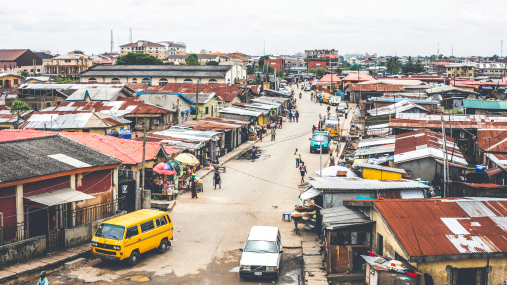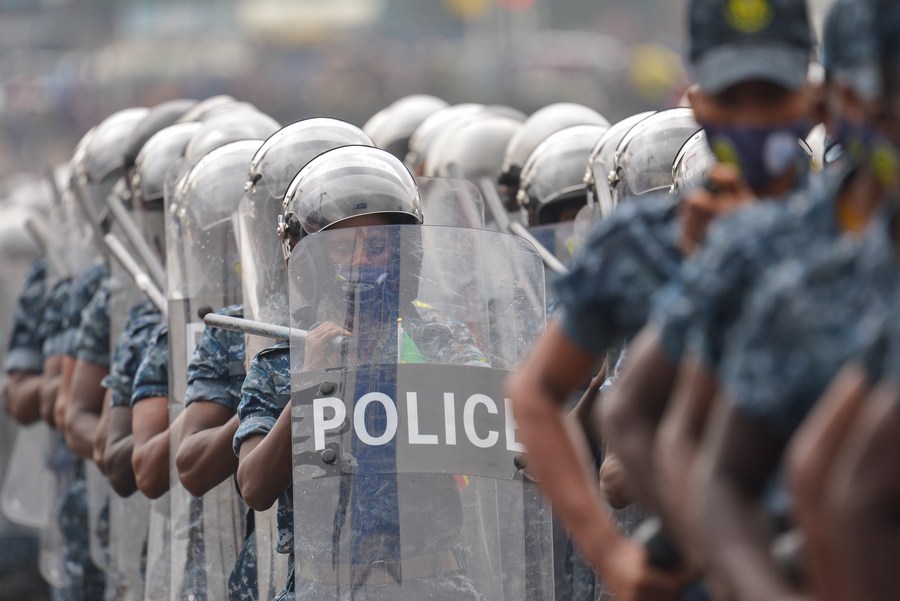
Editor's note: Stephen Ndegwa is a Nairobi-based communication expert, scholar and lecturer at the United States International University-Africa, author and international affairs columnist. The article reflects the author's opinions and not necessarily the views of CGTN.
The kidnapping of 140 students by armed militia in northwestern Nigeria on July 5 has yet again exacerbated the social and political crisis plaguing the country for decades. The incident is another episode of scores of similar happenings which successive regimes have been unable to resolve.
Curiously, the notorious Boko Haram terrorist group has not claimed any responsibility yet. If the outfit is not responsible, it means there are other groups that have been emboldened to engage in crimes of such magnitude. Boko Haram, whose English translation means "Western education is forbidden," engages in kidnapping mainly for political and religious reasons.
According to authorities and press reports, the recent kidnapping and others preceding it are motivated by ransom demands, which would then mean that it has become a lucrative venture. But experts are still in a quandary as to who is behind these spates of financially motivated kidnappings and where the ransom money is going to.
Moreover, Nigeria is the richest country in Africa, which according to the latest International Monetary Fund statistics has a GDP of $514.05 billion. Therefore, the country has the requisite resources to not only track down the kidnappers, but also to put a definite stop to the practice.
It is not just a Nigerian problem though. Armed militias are a fact of life in many African countries. It is instructive that these rag tag armies operate with impunity, some even across borders. For instance, Boko Haram has turned the Lake Chad Basin comprising Nigeria, Niger, Chad and Cameroon into a major conflict zone, wreaking havoc on citizens at will.
The logistics of kidnapping a large number of children, transporting them over long distances and accommodating them undetected for months and even years is simply not possible in this time and age when surveillance technology is so developed. Some observers are therefore of the view that many of these crimes are done with the complicity of powerful forces both in and outside respective governments.

The Ethiopian Federal Police Force stages a military parade displaying weapons and anti-riot gear in Meskel Square, Addis Ababa, capital of Ethiopia, September 30, 2020. /Xinhua
The Ethiopian Federal Police Force stages a military parade displaying weapons and anti-riot gear in Meskel Square, Addis Ababa, capital of Ethiopia, September 30, 2020. /Xinhua
The motivating factor behind such an improbable alliance is a deadly mix of money and politics. Some powerful forces, mainly Western corporations, offer funding and protection to local militias, who in turn act as "security" to foreign looters of expensive resources in remote parts of African countries in cahoots with local players.
It is reminiscent of trade in the so-called "blood diamonds" which contributed to devastating conflicts in countries such as Angola, Cote d'Ivoire, the Democratic Republic of Congo and Sierra Leone. Proceeds from the sale of the rough diamonds were used by rebel movements in these countries to finance wars against their governments.
Currently, Africa is dotted with militia groups angling for power or protecting political interests in several countries. Current hotspots in the continent include Eastern Congo where several rebel groups have forced thousands of people to flee their homes in the past two years. In Mozambique, hundreds of citizens continue to flee the Palma district consequent to the attack by insurgents in March this year. Darfur region in western Sudan is in a continuously fluid state as is the insecurity in several parts of South Sudan, which have been turned into fiefdoms under the command of warlords.
Somalia has never known peace since the overthrow of former President Siad Barre in January 1991, with the West accusing the country of acting as a breeding ground for international terrorist organizations. The Central African Republic has not known peace since violence erupted in 2012 between a coalition of rebel groups and the nation's government.
Still, poverty has contributed significantly in the formation and sustenance of these groups. It is easy to mobilize and recruit young men in such gangs since they find it as an escape from a life of utter desperation. The majority of the rank and file of these groups are also illiterate and, therefore, easy to manipulate. The militias offer not just a source of income, but an identity as well.
Ultimately, the African Union (AU) needs to pressurize member governments to do more to protect their citizens. The first step is revisiting the AU's still unsuccessful campaign on "Silencing the Guns in Africa by 2020," which aimed to achieve a conflict-free Africa, prevent genocide, make peace a reality for all and rid the continent of wars, violent conflicts, human rights violations and humanitarian disasters.
The organization also needs to drum up more support for Agenda 2063 goal No. 13 that aims at preserving peace, security and stability. Of course, this cannot happen with the almost daily flare-ups in the continent. Peace should be the top priority of African leaders. Without it, all lofty plans including the latest establishment of the African Continental Free Trade Area will remain dreams on paper.
(If you want to contribute and have specific expertise, please contact us at opinions@cgtn.com.)

